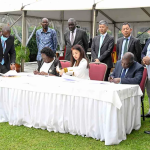Uganda’s Fuel Industry Faces Scrutiny for Standards Violations

The government plans to conduct an operation against non-compliant fuel stations violating established standards, such as improper locations and congestion. The Fuel Marking and Quality Monitoring Program has reduced fuel adulteration, with a high compliance rate of 99.5%.
Government will soon conduct an operation against fuel station operators who have violated the set establishment standards.
These are mainly those that have constructed stations in road reserves and closer to each other than what the regulations stipulate, according to the ministry of Energy and Mineral Development and the Uganda National Bureau of Standards.
The two were conducting a sensitization exercise for the Fuel Marking and Quality Monitoring program (FMQMP) in the western Uganda districts of lbanda, lshaka, Mbarara, Ntungamo and Rukungiri.
Peter Kitimbo, the FMQMP Field Supervisor said congestion was one of the challenges facing the industry with many operators in different towns setting up stations without complying with the regulations.
“The standard stipulates the distance allowed between two fuel stations and there’s a plan by the authorities to harmonize locations for congested fuel stations, for example, if three stations are near each other, they will be required to harmonize and work together as one station,” said Kitimbo. He did not reveal when this would start.
“Some of the stations are constructed in road reserves, some at shop verandas, others have no canopy, and all this is not acceptable according to the standards,” Kitimbo said, adding that many stations also violate the space standards. “The minimum area size should be 100ftX100ft but you find fuel stations operating in a lesser area than that stipulated by the standard.”
Just about 25 fuel stations registered to do business have been found to be non-compliant to the national standards for fuel and the fuel infrastructure.
Kitimbo revealed that by close of December 2023, a total of 4,786 retail fuel stations were registered in the ministry’s database, and that the compliance rate was now at 99.5 percent.
The Government introduced the fuel marking programme so that all fuel meant for local consumption is marked at the border points to ensure quality and protect consumers. “Because of this program, fuel adulteration has reduced to less than 1 percent in Uganda,” said John Friday, the acting Assistant Commissioner, Monitoring, and Inspection in the Petroleum Supply Department.
The Ministry and UNBS urged all fuel station owners to ensure compliance to the standards requirements for setting up and operating fuel stations, as well as petroleum products standards, instead of waiting for regulators and enforcers of the standards.
“I would like to encourage fuel dealers to be ethical and upright in the delivery of services to the public. Embrace self-regulation in respect to quality and quantity standards because you too are consumers of this fuel,” said Daniel Nangalama, the acting UNBS Executive Director.
He explained that the quality requirements and standards specifications for the fuel business have been shared to maximize compliance and ethics. Nangalama also explained how important it was for the local leaders to work jointly with the government agencies. This, according to him, helps to strengthen synergies for smooth flow of information between the fuel suppliers, consumers, government Ministries, Departments and Agencies.
“The Fuel Marking and Quality Monitoring Program has brought on board mobile laboratories with advanced technology that has enabled testing of fuel quality at different fuel stations in all corners of the country, which has improved the compliance rates,” he added.
Kitimbo urged the fuel dealers to acquire the standards and ensure compliance through self-regulation. The various standards for the industry are also available on the UNBS website.
UNBS says the members of the public have a right and away to seek help in cases of substandard services, by reporting to using Toll Free line 0800133133 or the WhatsApp line 0713227580.







